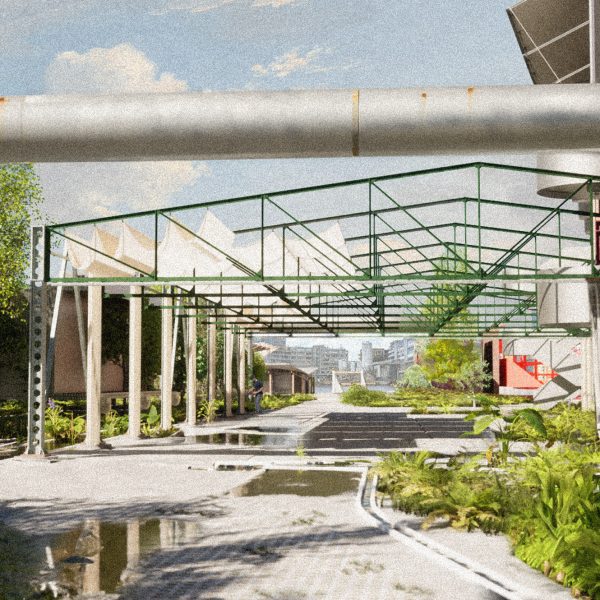Dezeen School Shows: a leisure centre which utilises an energy-saving model through sustainable heating and cooling methods is included in Dezeen’s latest school show by students at Kingston University.
Also included is the proposal for a reimagined building in London, UK which utilises materials like rammed earth and stone and a vineyard in Portugal built atop a silo structure.
Institution: Kingston University
School: Kingston School of Art
Course: BA Architecture, MA Architecture
Tutors: Diego Calderon, Paco Esteras de las Heras, Jamie Irving, Daria Moatazed-Keivani, Andrew Budd, Jane Houghton, Laura Evans, Douglas Murphy, Chris Pendrich, Maija Viksne, Astrid Smitham, Nicholas Lobo Brennan, Will Burges, Jade Huang, Tobias, Jewson, Aoife Donnelly, Thom Brisco, Takeshi Hayatsu, Salah Krichen, Tina Jadav and Alexander Gore
School statement:
“The Department of Architecture and Landscape at Kingston has established a clear position within the UK context of architecture and landscape education.
“Our concern with continuity in architectural culture, and in making work which is sensitive to situation and context, places us in a notional community of European schools in places as diverse as Ireland, Switzerland, Scandinavia and Iberia. The graduating practitioner from Kingston is a generalist capable of thinking and making with the technical and critical skills required to be both nimble and empowered to act in today’s diverse architectural and landscape culture.
“Our situation as part of the School of Art and Architecture is key to our identity. The large workshops and the ethos of thinking through making speak of the inherent dynamic of how we see architectural and landscape knowledge generated in the productive tension between tectonics and representation.
“This is a fundamental and essential part of how the department seeks to enable its students; firstly through a direct and immediate connection with how things are made and the nature of the spaces that result; and secondly with how it is represented critically. These are equally valued as a way of interrogating, contextualising and developing a critical position, one that is unique in the UK context.
“Our reputation is reflected by our continued presence in the Domus listing of the top 50 Architecture Schools in Europe, and our students and staff continue to win prestigious industry awards, including regular successes in the RIBA President’s Medals.”
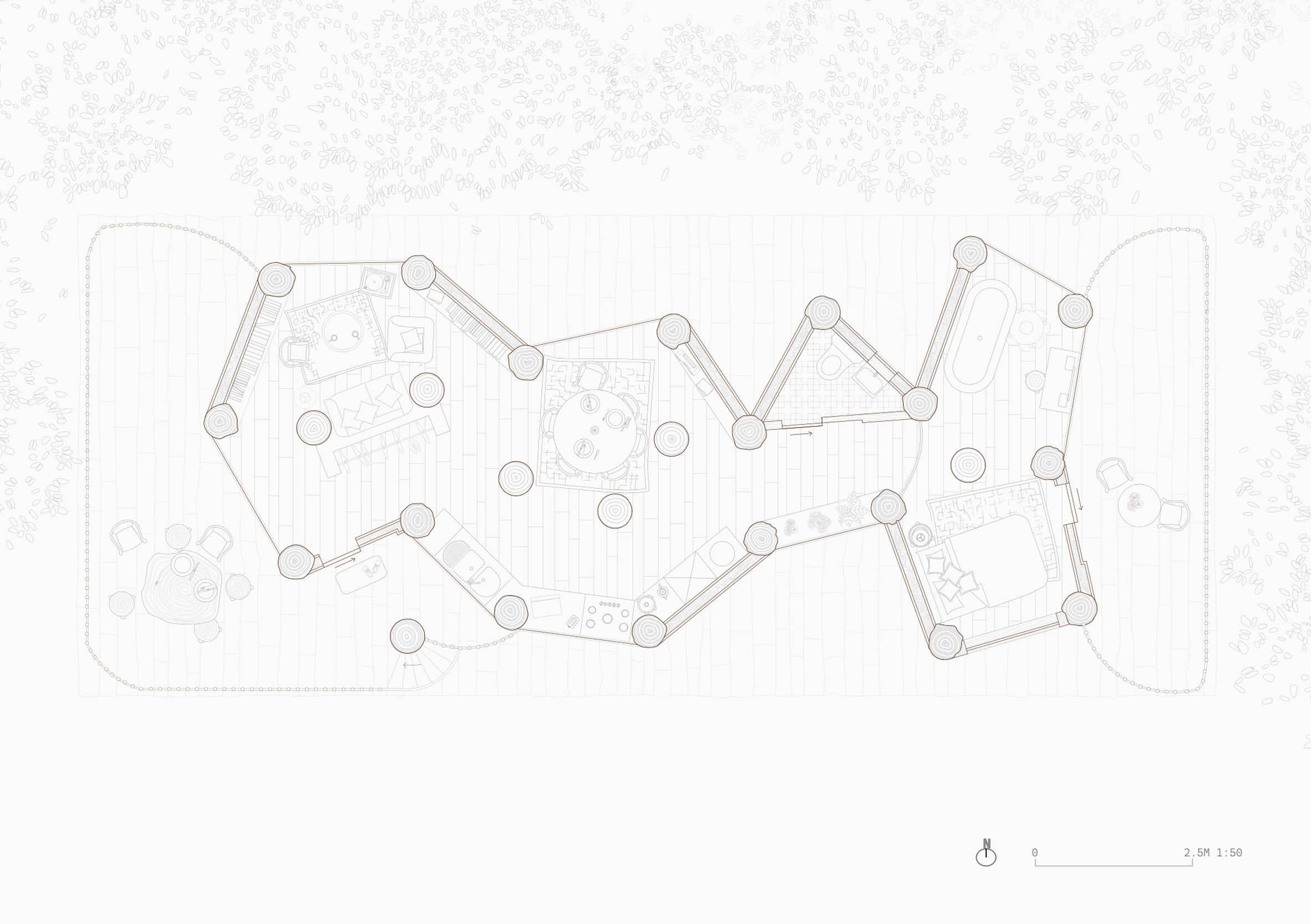
Unprocessed by Robyn Doyle
“This project is a study into the potential use of unprocessed timber.
“The protagonist, a forester, arrives intent on tending the land of this Norfolk forest and eventually establishing a centre for timber production.
“For this, they require two buildings – a house and a production facility – made using only the wood immediately available on site.
To save time, this wood will be unprocessed; a deep study of vernacular methods of timber construction led to the identification and adaptation of particular building techniques that can facilitate the use of timber early in its production cycle.
“Over the course of the project, the structural and ecological advantages of raw timber revealed themselves, elevating it above a fetishised novelty or ornament to become a genuine alternative method of construction.”
Student: Robyn Doyle
Course: BA (Hons) Architecture RIBA Part 1
Tutors: Studio 3.6; Jamie Irving and Daria Moatazed-Keivani
Email: [email protected]
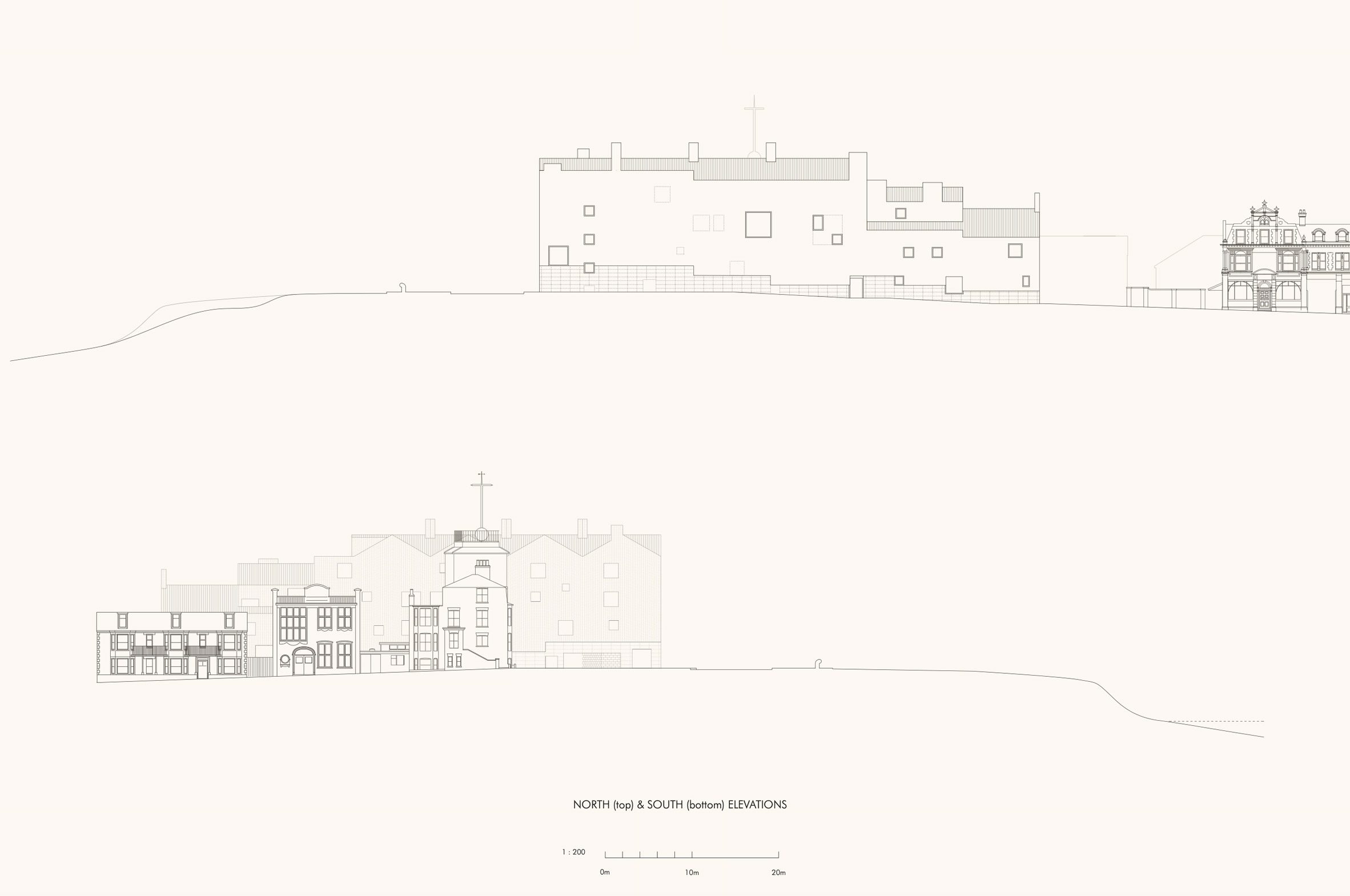
Deal Concert Hall: a Return to Music by Harry Bellamy
“The Kent town of Deal, although first appearing perhaps chaotic and unregulated, in fact embodies a very structured approach to town planning, enabled as a result of the booming naval industries of the past.
“It has a linear relationship with the coastline, with unbuilt space swelling in and out of this unconscious grid.
“The proposal for a new concert hall aims to mimic this linear typology through adopting a language that synthesises the existing place-specific architecture, and this new, contemporary addition, endeavouring to create a seamless new piece of town slotted amongst the existing fabric.
“The building is designed around the human experience, creating a layered formation of spaces to soften the transition between the exposed, ever-changing coastal environment and the calm and composed inner world of the concert hall.”
Student: Harry Bellamy
Course: BA (Hons) Architecture RIBA Part 1
Tutors: Studio 3.5; Andrew Budd and Jane Houghton
Email: [email protected]
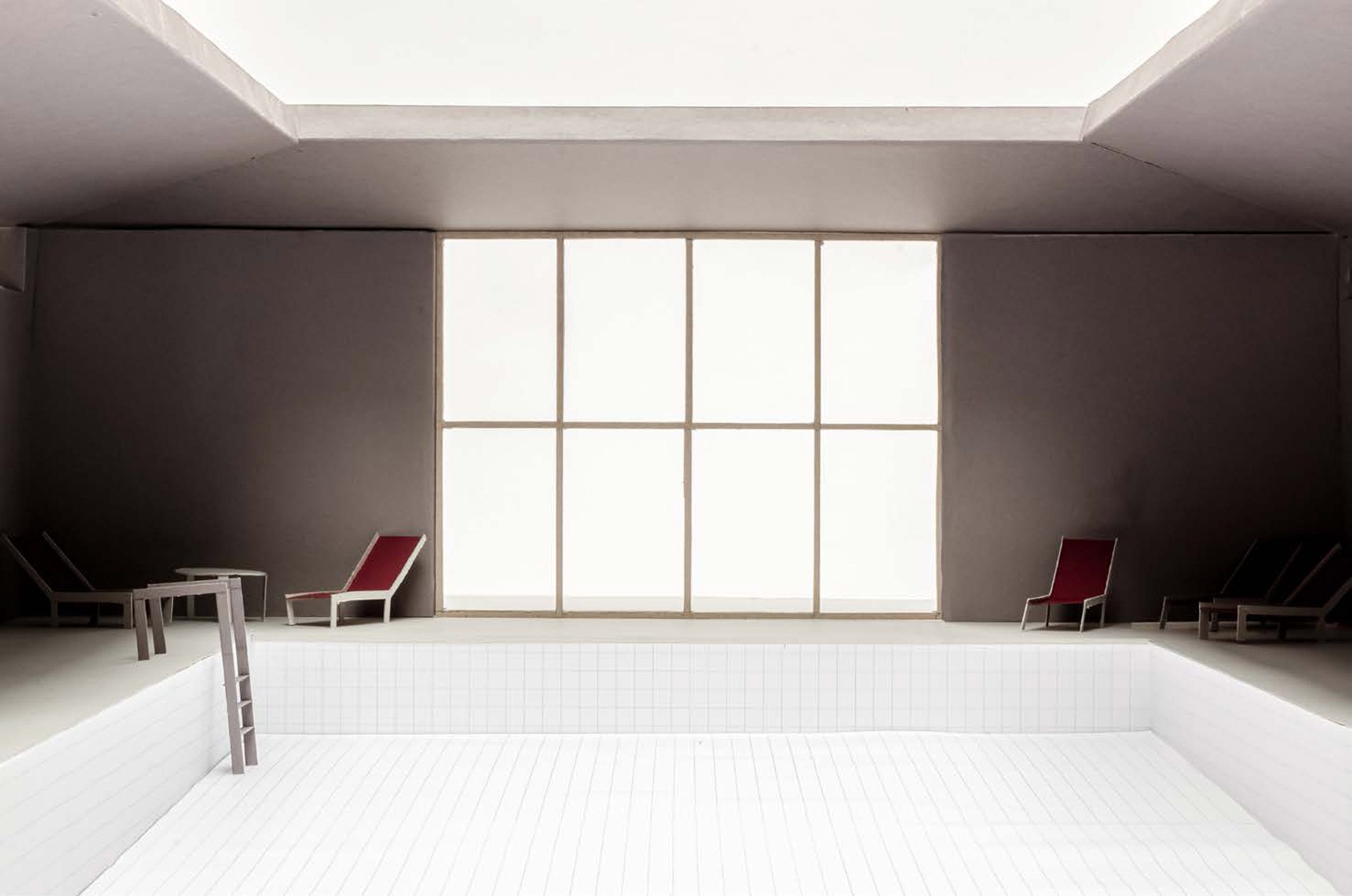
Kingfisher Lido by Euan Bailey
“This project proposes a replacement for Kingston’s much loved and now demolished Kingfisher Leisure Centre.
Inspired by Roman bathhouses, the proposal supports both physical activity and the exercise of the mind and creates a place where bathing, sport and learning live side-by-side through the provision of sports halls, gym spaces and mixed-use studios for teaching and learning.
The new building addresses the enormous energy consumption of traditional leisure centres by exploring more sustainable high and low-tech alternatives for heating and cooling.
“This includes connecting the building to a proposed district heating network, feeding off excess heat from the Hogsmill Sewage Treatment Works and Kingston Crematorium and using it to heat up the building and indoor pool water.
“The pool can then also be used as a thermal store outside of operational hours, recapturing the heat from the water and pumping it through its own local heating network.”
Student: Euan Bailey
Course: BA (Hons) Architecture RIBA Part 1
Tutors: Studio 3.3; Laura Evans and Douglas Murphy
Email: [email protected]
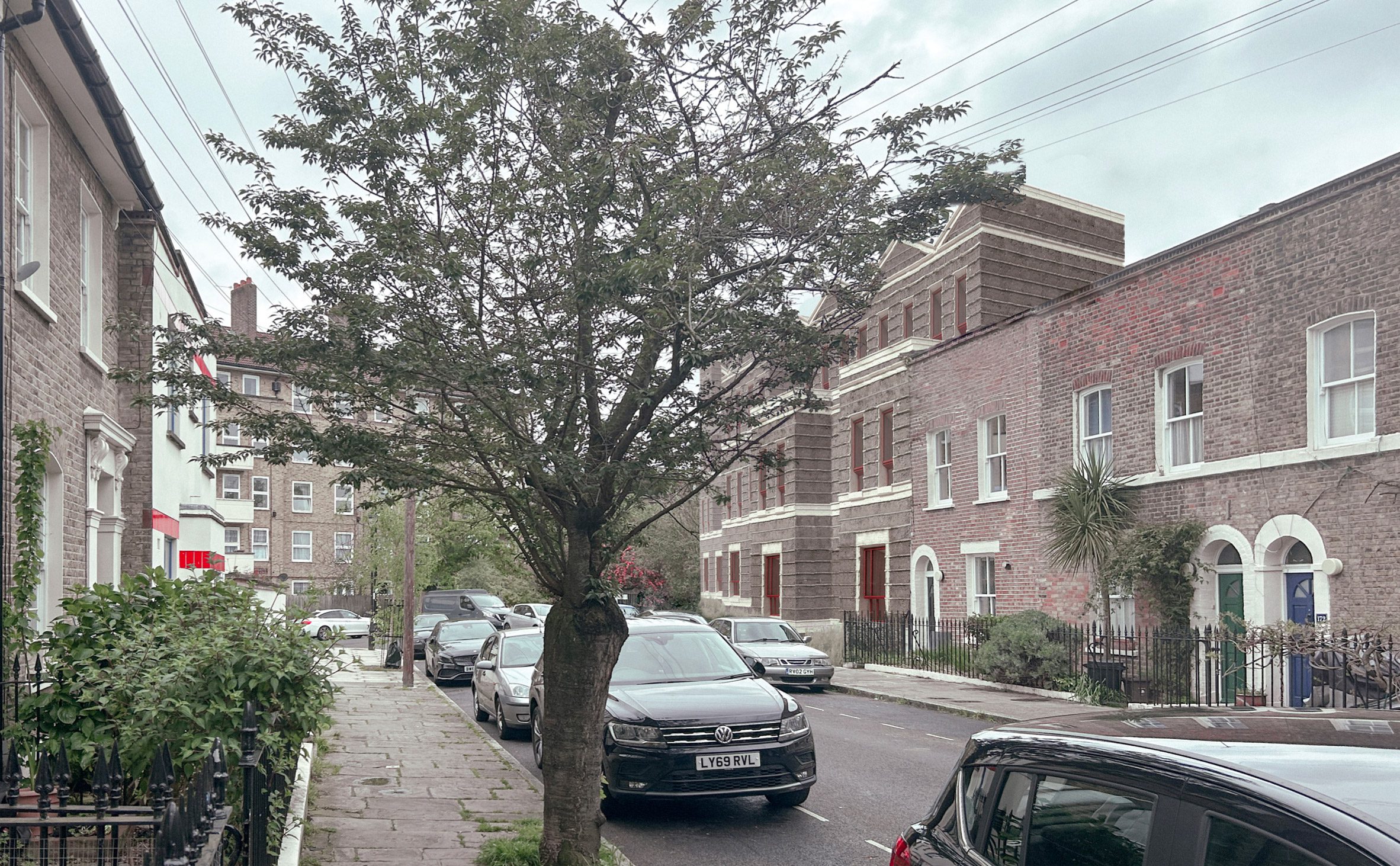
Sustainably Bringing Vernacular London Architecture into the 21st Century by Bertolt Bohn
“Through the lens of an apartment building on the Regent’s Canal in East London, the project examines how spatial ideas could be drawn from London’s terraced house typologies, reinvented for contemporary living and realised in largely unprocessed materials of UK origin.
“The resulting timber and earth building explores a language derived from its own material constraints – the prominent erosion breaks required to protect rammed earth, the limited structural spans of UK-grown softwood and the local context, where the varied ornamental mouldings and roof forms of Victorian terraces are taken up and reimagined for the 21st century.”
Student: Bertolt Bohn
Course: BA (Hons) Architecture RIBA Part 1
Tutors: Studio 3.4; Chris Pendrich and Maija Viksne
Email: [email protected]
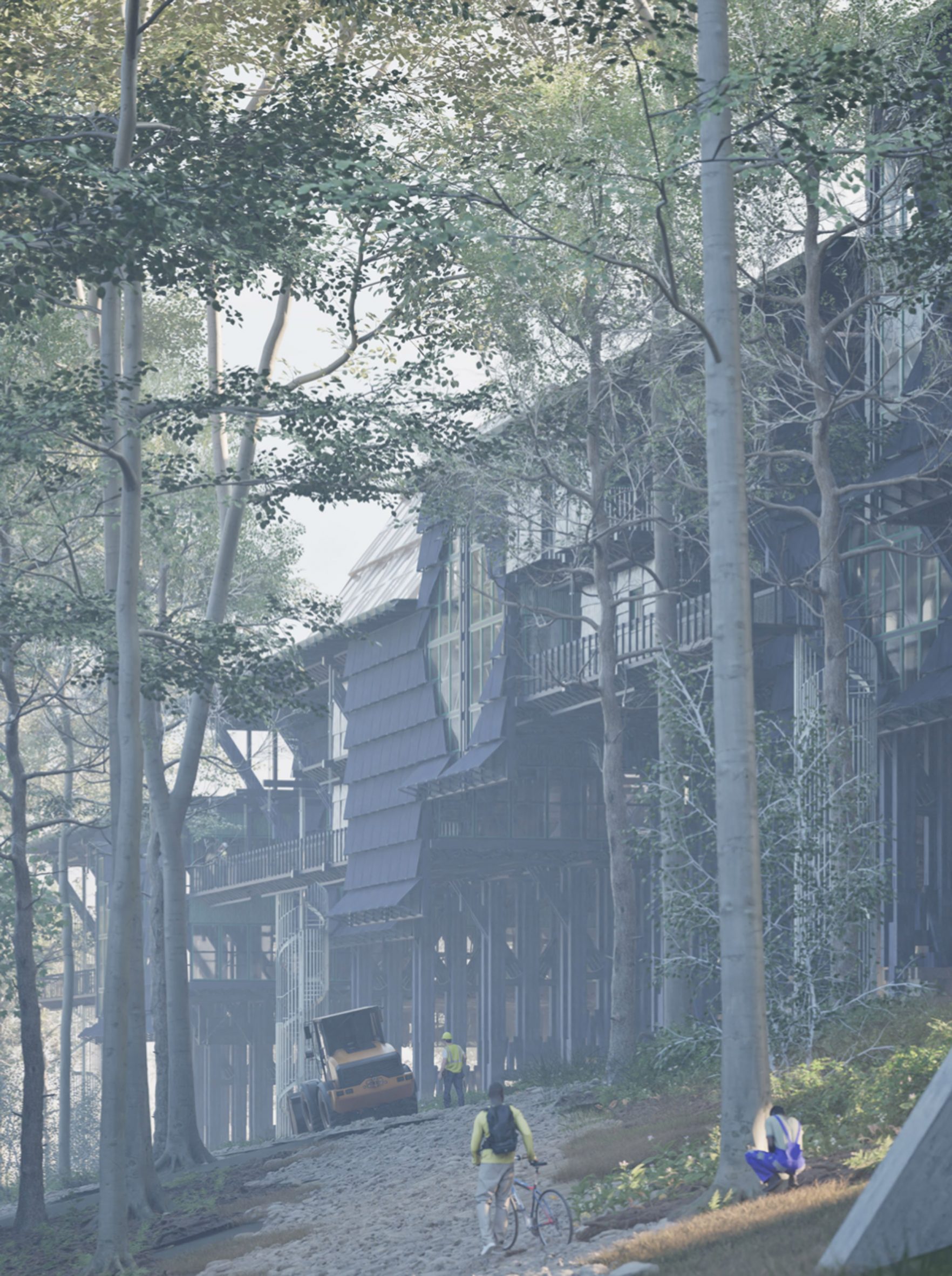
Mierceholts New National Timber Reserve by Jack Oaten
“This project proposes a new industrial forest stretching from the Forest of Dean to the Forest of Bowland.
“A forest of this scale will produce an annual yield of 12.7 million tonnes a year, which is enough replace a quarter of all materials used in the construction industry in the UK and cut imports to zero.
“A series of six industrial sawmills will line the new forest bordering Wales, each a model village, containing housing and amenities.
“The project will create a new typology for building in the UK, one which recalls timber frame buildings built between the 13th and the 18th centuries but at the scale of systems (strategic and operational), necessary within new frameworks of post human globe heating.”
Student: Jack Oaten
Course: M.Arch Architecture RIBA Part 2
Tutors: U9 Apparata; Astrid Smitham and Nicholas Lobo Brennan
Email: [email protected]

Ultra Town by Joe Franklin
“Ultra Town reimagines the aborted HS2 phase 02 site as a forested new town.
“A 120km piece of social and ecological infrastructure that responds to our housing and climate crises, whilst adding to the rich history of the woods at the same time.
“Particularly as a space for protest, misfits and a counterculture.
“The project is drawn over a period of 50 years and across a number of phases, from enabling services to forms of industry, pieces of social infrastructure and housing.
“Thus, proposing a method of responsible development embedded with cycles of support, maintenance and care.”
Student: Joe Franklin
Course: M.Arch Architecture RIBA Part 2
Tutors: U9 Apparata; Astrid Smitham and Nicholas Lobo Brennan
Email: [email protected]
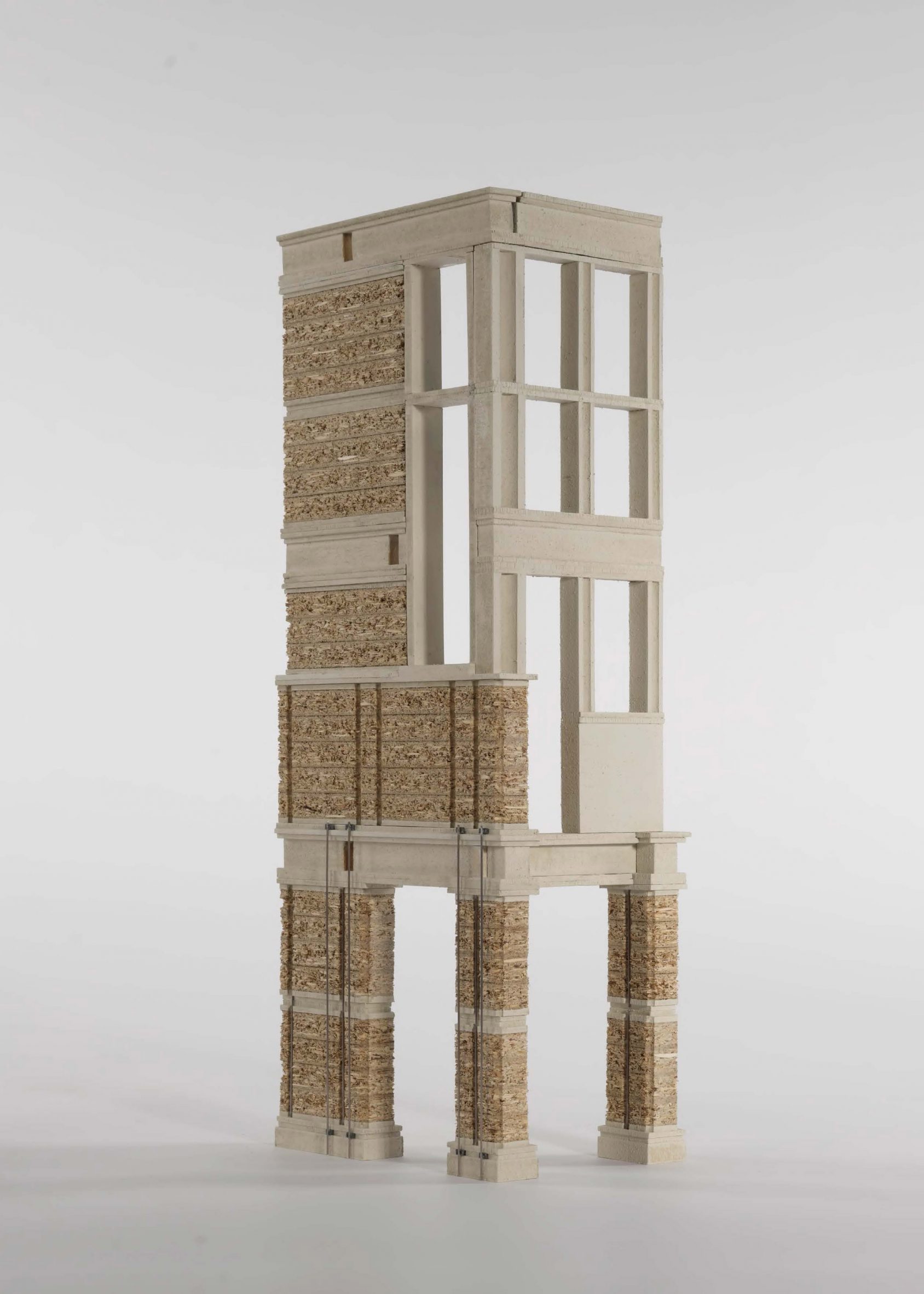
The Caxton Foundation by Emily Walker
“The reimagined Caxton Hall responds to the unit’s concerns around how to make a good city, deploying new, less carbon intensive means to do so.
“Responding to the shift from dense historic grain of the city to its fragmented fabric of today, the proposal combines prefabricated rammed earth and stone construction, in a manner that borrows from classicism, but is entirely contemporary.
“Resurrecting a lost function, the project has a sequence of generous public spaces from forum to hall at its heart, while equally providing moments of intimacy; ‘a good room’ defined by its language of making.
“The building promotes different forms of assembly, addressing the need to encourage public discourse and storytelling within the city.
“The rooftop will stand as a gift to the city, a space for open assembly held within a lightweight roof structure that sits atop a mass of stone and earth below.”
Student: Emily Walker
Course: M.Arch Architecture RIBA Part 2
Tutors: U7 31-44; Will Burges, Jade Huang and Tobias Jewson
Email: [email protected]
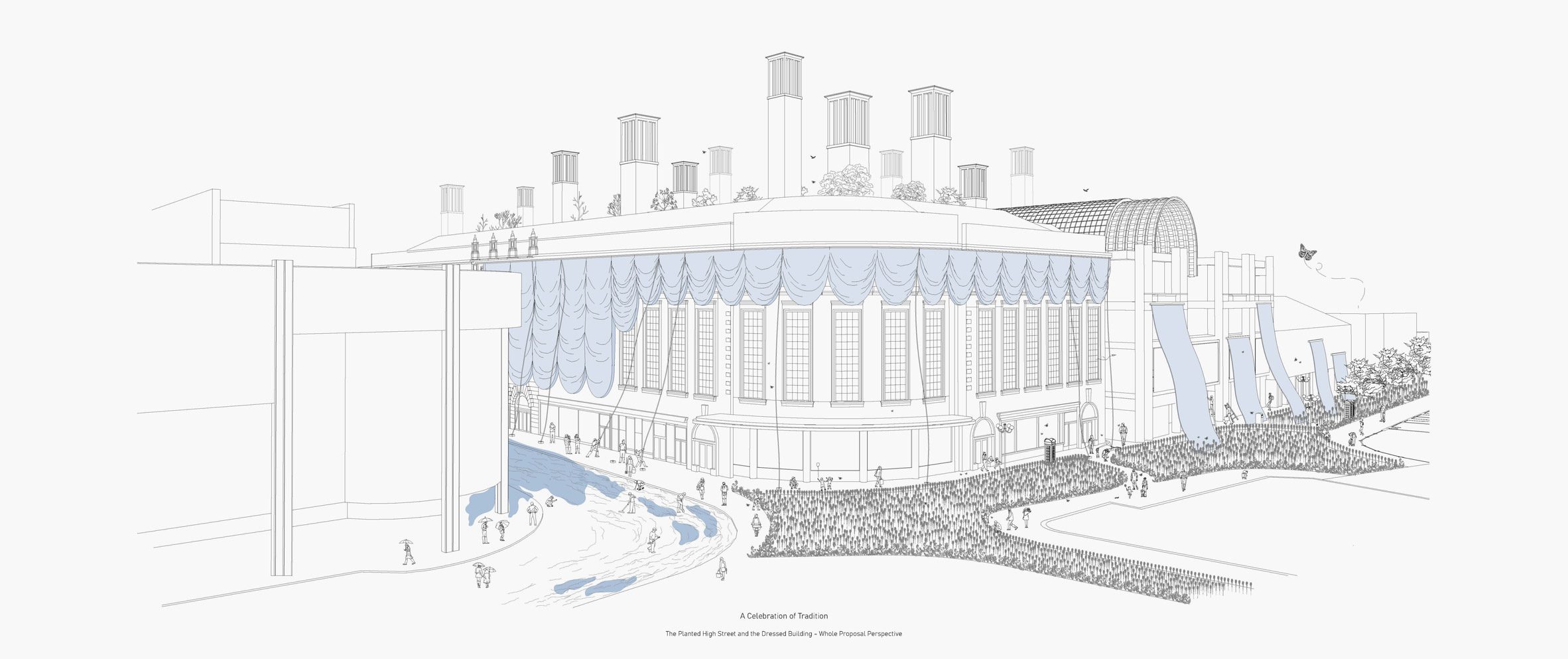
When The Water Claims The Land by Fatima Salim
“The declining footfall of town centres is becoming increasingly problematic for councils and communities alike, with high streets losing their charm and draw as destinations for the public.
“The project retains the Bentall Centre as a shopping district, part converting the ground floor into community textile workshops, the building becomes a passive, energy efficient host, with a blue/green roof and community reed huts and the high street planted with flax to minimise flooding and enhance biodiversity.
“The design incorporates traditional thermal and ventilation methods from Asia and Eastern Europe, using the existing ventilation shafts in the Bentalls as ‘wind catchers’.
“The thermal strategy will ‘dress and undress’ the Bentalls according to the seasons.”
Student: Fatima Salim
Course: M.Arch Architecture RIBA Part 2
Tutors: U5 Takeshi Hayatsu, Salah Krichen 121 Collective and Tina Jadev GLA
Email: [email protected]
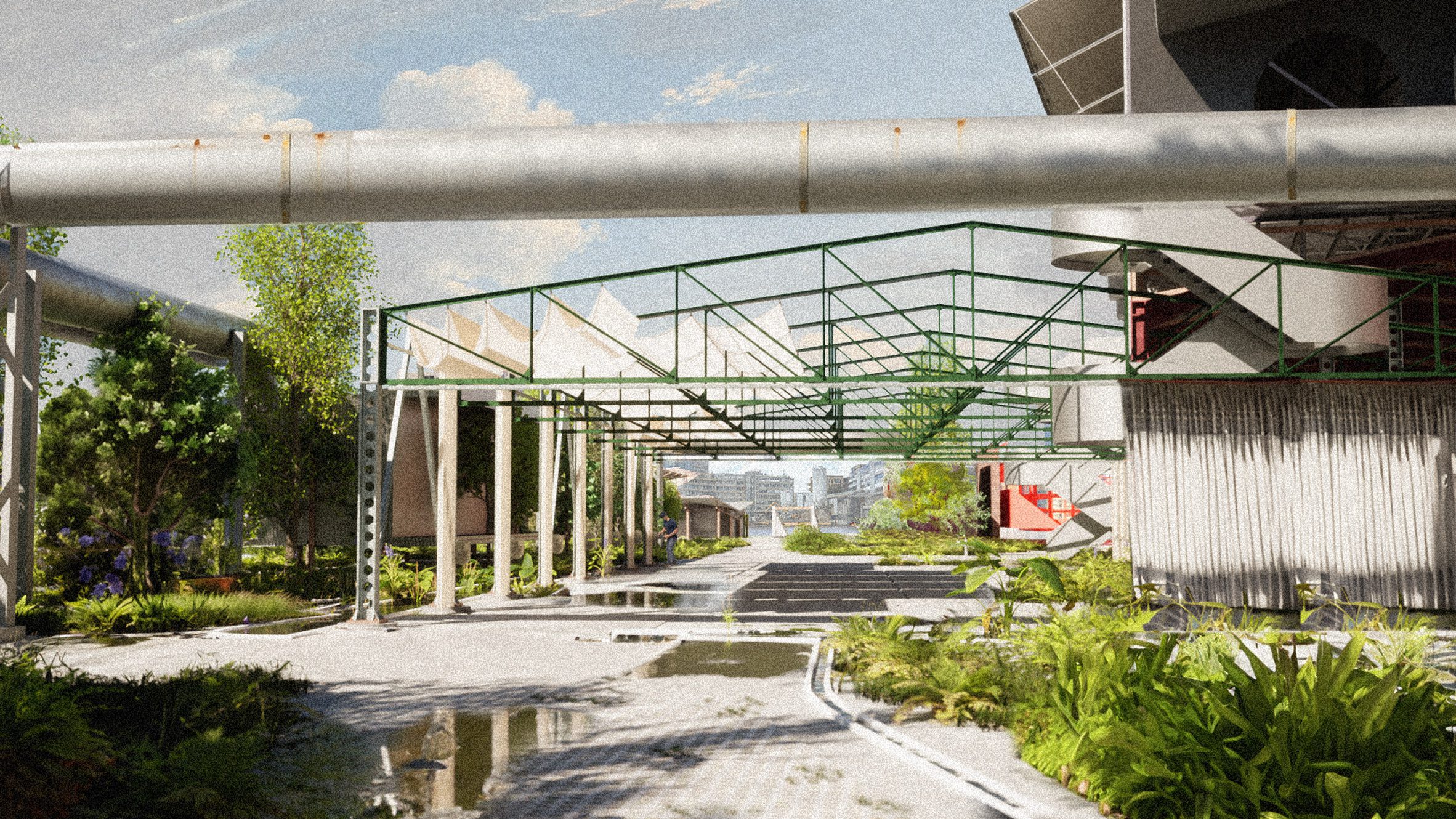
Embracing Tension: Wandsworth Gas Works by Will Pike
“Can a dialectic architecture reconnect us with our core infrastructure and help us learn how our actions impact the places we live? Can the adoption of tension, cracks, temporality and ruination help us do so?
“Through the advent of the Anthropocene, humans have increasingly moved production, industry and in particular waste to the peripheries of our cities, ironically leading us to become more effective at producing it.
“Through a combined landscape and architectural strategy, the project advocates for the reversal of such divorce, provoking a change in our cultural connection to the assembly and processes inherent in our cities.
“This strategy focuses on the tensioned, transitional spaces abundant in our built environment, leftover from inward looking commoditised development, instead proposing these as destinations.
“This can be accomplished through the synthesised weaving, layering and piercing of industry, leisure, transport and ecology infrastructure programmes in close proximity; programmatically and tectonically.”
Student: Will Pike
Course: M.Arch Architecture RIBA Part 2
Tutors: Aoife Donnelly and Thom Brisco
Email: [email protected]
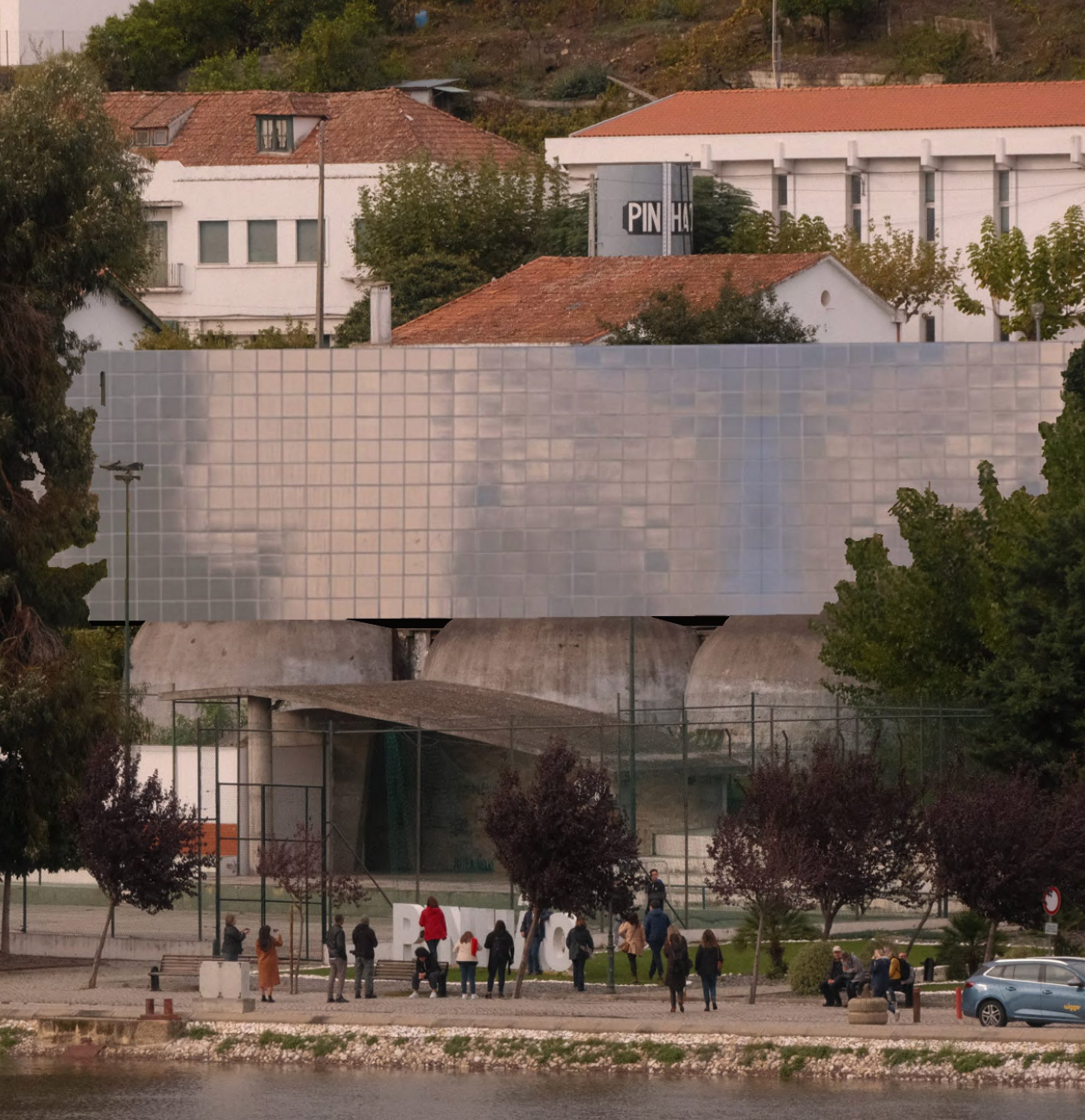
Espinha Dorsal of the Marginal: a winery for Pinhão by Louis Goeke
“The Portuguese town of Pinhão is characterised by dense inhabitation and large areas of vineyards; public open space is rare.
“The project aims to not take away this already limited open space from the community by placing a new building onto it, but rather to preserve what is there and further enhance it; this will be achieved by building on top of an existing silo structure, fully integrating this into the new building.
“While the primary purpose of the building is to serve as a winery, it also acts as a social condenser, allowing public usage from within.
“During the harvest, seasonal workers will be able to stay here, and public uses will be put on hold.
“The different user groups are distributed vertically, so each floor is specifically adapted to its own, individual context.”
Student: Louis Goeke
Course: BA (Hons) Architecture RIBA Part 1
Tutors: Studio 3.2; Diego Calderon and Paco Esteras de las Heras
Email: [email protected]
Partnership content
This school show is a partnership between Dezeen and Kingston University. Find out more about Dezeen partnership content here.

